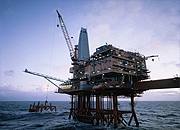“The safety of our colleagues and our suppliers on the Norwegian continental shelf (NCS) is our highest priority. This should be clearly understood by everyone and it requires a good dialogue between management, our employees, their associations and our safety delegates. We are now focusing intensely on this dialogue and Gullfaks management is now looking specifically into how we can strengthen it,” says executive vice president Øystein Michelsen.
Several topical issues
Statoil has for some time noted a number of media articles in which employees have spoken out, saying that they are worried about offshore working conditions. In similar fashion, management has received some concerned reports on the same matters from individuals and the safety delegates on Gullfaks.
“These are matters that Statoil takes very seriously and we will pursue them closely together with our employee representatives and the safety delegates,” says Michelsen.
The operational model introduced on the NCS last year, and the ongoing restructuring of the safety delegate service, have been important topics in the Gullfaks organisation for some time. All safety delegates have played an active role in these processes. The operational model is now subject to an evaluation which will consider how to utilise the resources and shared functions of the model. In this connection, the safety delegates on Gullfaks have pointed to several issues that it is vital to address in the evaluation.
Restructuring the safety delegate service
After the merger, and with the introduction of a new operational model, a review of the safety delegate service was also conducted. The principle of the new model is that the chief safety delegates belong to a specific installation, an arrangement that will allow for a closer dialogue and direct, on-the-spot interaction with platform management. For Gullfaks, the restructuring will mean that the chief safety delegates have a dedicated role vis-à-vis the installation in question.
“The issues that the safety delegates on Gullfaks have raised, in connection with the restructuring of the safety delegate service, will be dealt with in our continuing work on the field-specific change to a new arrangement. We are ready to work closely with the chief safety delegates on Gullfaks,” says Michelsen.
Sub-surface conditions
Well integrity and other sub-surface matters have been on the agenda of the Gullfaks organisation since the well incident on Gullfaks C in May last year. The investigation revealed several areas that need to be tackled, among them well monitoring. This has resulted in our closing 20 wells on the field. The wells are now being scrutinised in order to evaluate their integrity. If it should emerge that there is a fault in the barriers, we will implement remedial measures. In addition, the pressure conditions in the Shetland formation and drilling of relief wells are areas where all our expertise has been applied in a thorough and extensive programme of work of late.
“The chief safety delegates and management on Gullfaks agree that this situation does not reduce the level of safety on the field, a viewpoint shared by the Petroleum Safety Authority Norway,” states Michelsen.
The road ahead
”The NCS is maturing, and we have to adapt to new overall conditions and to technological change. The operational model was introduced to bring us in line with the new reality – while at the same time helping to boost the level of safety for our employees on the NCS. Good interaction and constructive discussions between the employee representatives, the safety delegate service and management are important pre-conditions for our success here.”
16 Февраля 2026 | понедельник | 05:38


